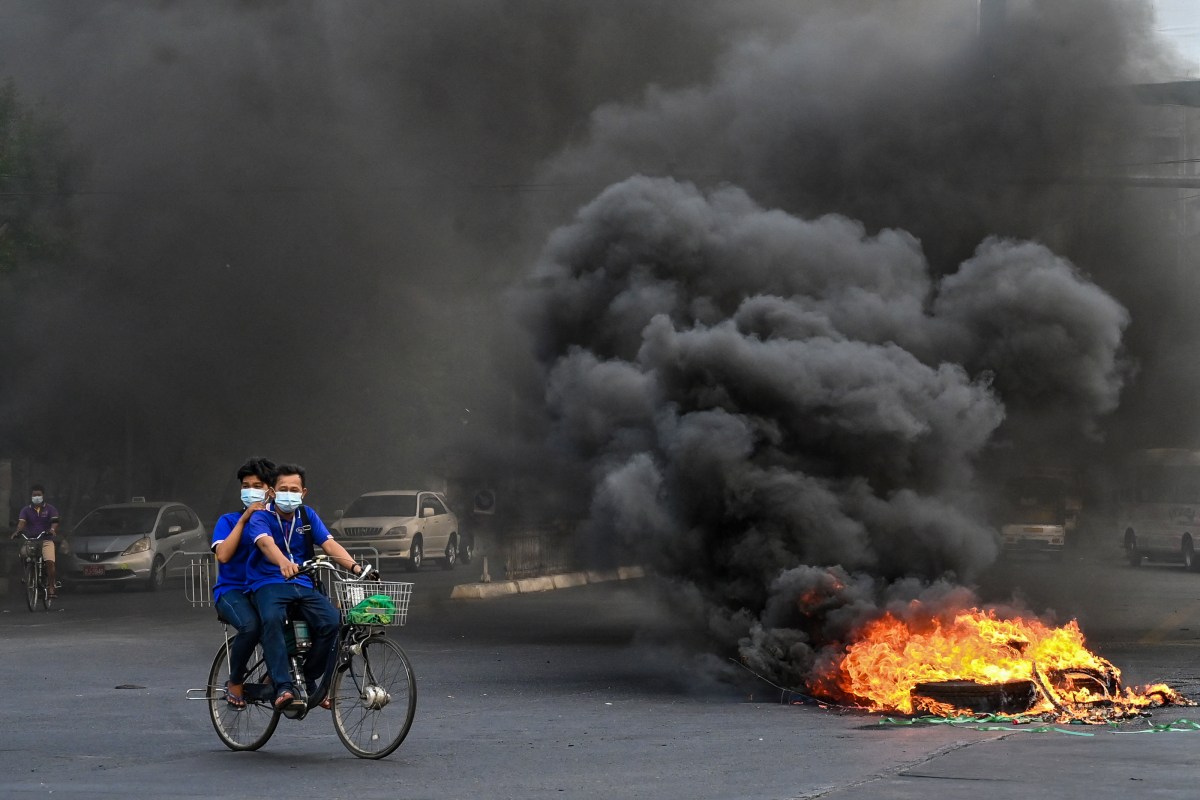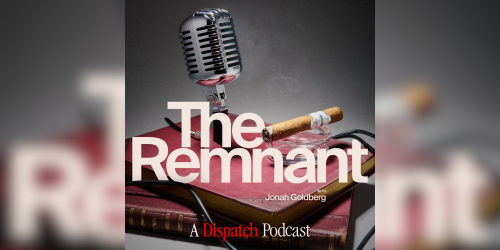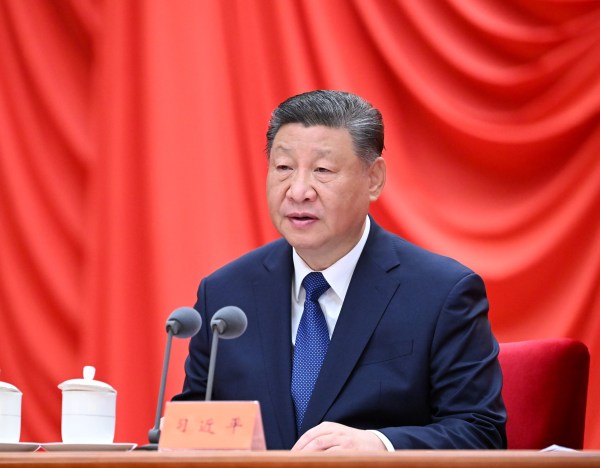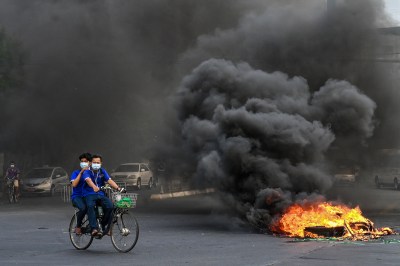Turn any article into a podcast. Upgrade now to start listening.
Premium Members can share articles with friends & family to bypass the paywall.
We’re hosting our next event, The Dispatch Town Hall: Grand Rapids on November 4! In partnership with Truscott Rossman and presented by The Bahnsen Group, we’re heading to Grand Rapids, Michigan, for a live recording of The Remnant. Jonah will be joined by Kevin D. Williamson and former Rep. Peter Meijer for a lively discussion about the state of politics today, hosted by The Acton Institute.
After the show, join your fellow Dispatch members for a live comments section—spirited conversation over drinks and hors d'oeuvres. Dispatch Premium members get exclusive VIP access to an intimate meet-and-greet with Jonah and Kevin before the taping.
Happy Wednesday! If you have a beloved dog or cat, and more money than sense, then good news: a New Zealand wine company now sells non-alcoholic wine for pets. The bottles have names such as Pawt, Champawgne, Purrno Noir, and Sauvignon Bark, but your dog will still probably prefer puddle water.
Quick Hits: Today’s Top Stories
- Argentine President Javier Milei visited the White House Tuesday, as his government faces mounting economic pressure ahead of Argentina’s midterm elections in which Milei’s La Libertad Avanza is expected to perform poorly. Milei’s visit centered on two goals: negotiating U.S. tariff exemptions for Argentine exports and discussing implementation of a $20 billion U.S. currency swap aimed at stabilizing the peso and replenishing Argentina’s foreign reserves. President Donald Trump praised Milei as “MAGA all the way” and said U.S. economic support may depend on whether Milei’s party remains in power. “If he wins, we’re staying with him and if he doesn’t win, we’re gone,” the president said. “If a socialist ... wins you feel a lot differently about making an investment.” In recent days, Argentine Economy Minister Luis Caputo said dollarization was “off the table,” but that the White House “is willing to keep buying pesos, financial dollars, future dollars, and bonds” in the country’s forex market.
- The IMF released its latest 2025 World Economic Outlook report on Tuesday, in which it projects global growth to slow down from 3.3 percent in 2024 to 3.2 percent in 2025 and 3.1 percent in 2026, along with slowing growth for the United States, China, and the EU. The U.S. economy is expected to cool to 2 percent growth this year, down from 2.8 percent in 2024. IMF Chief Economist Pierre-Olivier Gourinchas told Fox Business that the organization is not forecasting a U.S. recession at this time, though he noted the odds of a downturn have risen from about 25 percent to 37 percent. The IMF cites uncertainty over trade policy and supply chains, rising protectionism, labor supply shocks, fiscal vulnerabilities, potential financial market corrections, and the erosion of institutions as key reasons for a slowdown in global growth, though it also noted its global projections had been revised upward since its April report. Some analysts, however, caution that the IMF’s forecasts should be viewed with care, noting its past difficulty in predicting major economic events such as the 2008 financial crisis and the 2021 inflation surge.
- The S&P 500 and Nasdaq stock indexes fell before markets closed on Tuesday, as investor fears of brewing trade tension between the U.S. and China were only partly allayed by the expectation of rate cuts by the Fed. Treasury Secretary Scott Bessent told the Financial Times that China was deliberately trying to harm the global economy, saying “they want to pull everybody else down with them.” On Tuesday, China sanctioned five subsidiary companies of the South Korean company Hanwha Ocean in retaliation for a U.S. investigation into the Chinese shipping industry, and Trump threatened to halt U.S. imports of Chinese cooking oil in response to China’s complete halt on buying American soybeans (which you can read about in Monday’s TMD.) Trump and Chinese leader Xi Jinping are still planning to meet at the Asia-Pacific Economic Cooperation forum in South Korea in late October.
- Cody Balmer pleaded guilty to attempted murder of Pennsylvania Gov. Josh Shapiro and 21 counts of reckless endangerment on Tuesday, and as part of a plea deal, will face 25 to 50 years in prison. In April, Balmer scaled a fence surrounding the Pennsylvania governor’s mansion and attempted to set the building on fire, while Shapiro, his family, guests, and state troopers were inside. While turning himself in almost immediately after the attack, Balmer told a 911 operator that he targeted Shapiro because he was angry over the war in Israel, and also later told investigators that he planned to beat Shapiro with a sledgehammer if he encountered him.
- Trump announced Tuesday that the U.S. military had struck another boat off the coast of Venezuela, killing six people on board. Trump claimed that the boat was “associated with illicit narcoterrorist networks,” and that the strike had been conducted in international waters. It is the fifth such strike publicly announced by the administration, with a total of 27 people allegedly killed. Some senators and representatives have opposed the strikes as illegal acts of war. A vote last week on a proposed war powers resolution requiring congressional authorization for strikes failed to pass the Senate 48-51, with all Democrats except Sen. John Fetterman of Pennsylvania voting in favor, and all Republicans except Sens. Lisa Murkowski of Alaska and Rand Paul of Kentucky voting against. Sen. Ted Cruz of Texas was absent.
No Road to Mandalay

It looked like your average fitness video, one of many that popped up during the COVID-19 pandemic. But as Khing Hnin Wai, a 26-year-old aerobics instructor, pumped her arms up and down, she didn’t see the armed cars rolling behind her. In the background, the military was on its way to overthrow Burma’s democratic government.
The following four years have not been kind to the Chinese-bordering country. Under fractured rule by a military junta, the country’s economy has collapsed, and the ongoing civil war—between the junta and rebel coalition forces—has not spared civilians.
You are receiving the free, truncated version of The Morning Dispatch. To read the full newsletter—and unlock all of our stories, podcasts, and community benefits—join The Dispatch as a paying member.
Less than two weeks ago, one of the military’s motorized paragliders bombed the Burmese township of Chaung U, where approximately 100 civilians had gathered to celebrate a Buddhist holiday. The attack killed 24 people—including children—and injured 47 others. The military acknowledged its attack in a statement days later, criticizing rebel groups for supposedly “using civilians as human shields in their anti-government incitement campaigns.”
But it wasn’t an isolated incident. In April, the military conducted an airstrike it said was targeting “terrorists.” Local groups later verified that the strike killed at least 157 people, while the Washington Post reported in August that there were at least 25 children among those killed, including infants.
Burma—which the junta refers to as Myanmar—is no stranger to military rule. Outside the 10-year window of liberal democratic governance that lasted from 2011 to 2021, military junta commanders have governed the country for more than half a century, and they stole back power following a November 2020 national election in which the military’s political party underwhelmed at the ballot box. Junta leaders are currently planning, on December 28, to hold the first phase of elections to elect members of a new parliament, but this isn’t real democracy.
“The election is not an election,” Thomas Kean, a senior consultant on Burma and Bangladesh at the International Crisis Group and a journalist who has reported on the area since 2008, told TMD. “I mean, the military is essentially controlling the whole process.”
The military has maintained control of Burma’s capital city, Naypyidaw, along with the country’s most populated city, Yangon, and its second-most populated city, Mandalay. However, it has struggled to establish itself as the de facto governing body in the country. In 2024, the BBC reported that the military controlled a mere 21 percent of the country’s territory, while the armed opposing rebel coalition held power in a combined 42 percent of Burma.
The remaining third is contested and often caught in the throes of the civil war, with the country seeing more than 50,000 deaths—nearly 20 percent of whom were civilians—between 2021 and 2024, according to the Center for Excellence in Disaster Management and Humanitarian Assistance, a Defense Department unit that produces research on civil-military operations. In that span, only the Democratic Republic of Congo, Nigeria, and the Palestinian territories had higher civilian death tolls “resulting from conflict” than Burma. Recently, the military has launched aggressive campaigns to reclaim swaths of territory from rebel groups, partly to facilitate elections in those areas and lend legitimacy to the December election.
But its efforts to seize control have also isolated it from global partners. The junta used to move arms through Singapore, but in June 2024, Singapore’s Foreign Affairs Ministry announced it would “prohibit the transfer of arms” to Burma, due to the “military’s use of lethal force against unarmed civilians.”
“Evading sanctions has become harder than it used to be, because a lot of leading democracies, including Asian democracies, just tighten the screws,” Josh Kurlantzick, a senior fellow for Southeast Asia and South Asia at the Council on Foreign Relations, told TMD. The junta “can still get arms, but it’s gotten harder, and also they have almost no source of hard capital, so that also makes it harder.”
This has forced the military to adopt a lean and somewhat innovative approach to its battlefield operations. Helicopters and jets are increasingly falling into disrepair or being shot down, and the military has a scarce supply of jet fuel, which it cannot produce domestically. So, according to the Armed Conflict Location and Event Data Project, the military has deployed motorized paraglider bombers in at least 120 instances, such as the one used in its Buddhist festival attack last week. Such tactics may not look like innovative wartime technology, but as Kean explained, the junta “needs low-tech, cheap options that can be churned out quickly from its factories [and] require relatively little training,” and the paragliders have proven devastating.
But there is no long-term strategy here. Since Burma declared independence from the United Kingdom in 1948, and fighting between the government’s military and several armed ethnic minority forces broke out that same year, such clashes have rarely let up. “There’s no war plan,” Derek Mitchell, the former U.S. ambassador to Burma and current non-resident senior adviser at the Center for Strategic and International Studies, told TMD. “These guys, they’ve been fighting the same battle against ethnic minorities for 75 years. It’s really pathetic.”
He added that the killing of civilians is similarly not tactical. “It doesn’t get them anywhere. It’s not strategic. It’s just killing.”
The rebel forces resisting the military consist of armed ethnic minority fronts—many of which, according to Kurlantzick, “have actually battled each other over territory and resources” in the past—as well as new guerrilla militias formed since the 2021 coup. As Kurlantzick explained, after the military started jailing and killing protesters, many went “into the woods—Burma is still a pretty thickly forested place—where they crossed the border into Thailand, and they created a guerrilla army.”
Maintaining their alliance thus far has been “a miracle,” Kurlantzick added. “You have a loose coalition of these people who fled and tried to form an army—they’re mostly of the majority ethnic group—and then all these other much more historically weathered, battle-ready, and skilled ethnic minority groups all together fighting the junta.”
Gregory Poling, a senior fellow and director of the Center for Strategic and International Studies’ Southeast Asia Program and Asia Maritime Transparency Initiative, also emphasized that the rebel coalition resembles a network of anti-junta forces more than a single united front. “It’s not just a choice between engaging with a military and engaging with an opposition government,” he told TMD. “It’s more like engaging with two dozen different governments, some of which are trying to set up relatively democratic, stable institutions, some of which are narco-states.”
Against the backdrop of the ongoing civil war, the country has also faced economic strife. Burma’s currency, the kyat, inflated 34.1 percent in April from the 12 months prior. According to World Bank figures last updated in October 2024, Burma’s gross domestic product (GDP) is projected to shrink 2.5 percent in the 2025-26 fiscal year—in part, because of damage inflicted from a 7.7 magnitude earthquake in March.
“Because of the civil war, because different actors hold different parts of the country in so many different places, Myanmar is a failed state right now,” Kurlantzick said. “It’s become the world’s global hub for organized crime, narcotics crime, cyber scam crime, financial crime, and many others.” According to one analysis, the size of Burma’s illicit economy is more than half that of the country’s GDP.
Many Burmese seeking work turn to illegal industries, such as scam rings, as these are the only places where they can find employment. “They knew [scamming] was kind of illicit, but for them, it was [about] everyday survival,” Xu Peng, a postdoctoral researcher at the University of London’s School of Oriental and African Studies, told TMD. “Illicitness is kind of embedded in the Myanmar political economy. So, it wasn’t new for them.”

But since the COVID-19 pandemic, the country’s illicit economy has become more digitalized and moved largely online—in part because smuggling illegal goods across the Chinese border became far more difficult following China’s construction of a border wall to restrict crossings, which has remained in place beyond the pandemic. The wall has made it “basically impossible for people to cross the border,” Peng explained, so the market responded by creating a “digital version of the illicit economy.”
The World Bank concluded that, in the medium term, opportunities for economic growth and development within Burma are scarce, especially with no imminent end to the four-year-and-counting civil war. “Myanmar’s post-coup conflict has been absolutely devastating for people,” Kean explained, “not only economically, but also in terms of how they see the future.”
He added: “Many people just don’t have hope, right? They don’t see how this is going to end.”
Today’s Must-Read
John Brown’s body lies a-moldering in the grave, as the famous song (you know its melody as “The Battle Hymn of the Republic”) tells it, but that site is way far away in North Elba, New York, where he had once been part of a racially integrated colony; Brown’s most famous exploits were carried out down the road from Charles Town at Harpers Ferry and, most infamously, 1,200 miles away at Pottawatomie, Bleeding Kansas. But here in the seat of Jefferson County is where Brown was jailed, tried, and hanged for treason, the first American to suffer such a fate—but hanged under Virginia law rather than as a federal matter, in order to ... expedite the proceedings, if you know what I mean and I know that you do: Only 45 days passed between Brown’s arrest and execution. The people who hanged him, who would soon being “levying War” against the United States of America, had the gobsmacking audacity to charge Brown with treason to the state of Virginia, which in less than two years would host the rebel capital of the slave power; Brown argued that he could not commit treason against Virginia because he was not a Virginian—Q.E.D.
Toeing the Company Line
‘What’s Going On With Marjorie?’
A populist kook turns MAGA maverick.
Of Warriors and Wannabes
Hegseth’s ‘Department of War’ is a dangerous break with American military tradition.
Lasting Peace Requires Accepting Israel’s Right to Exist
Its enemies have historically taken the opposite position.
The Annual State of the Dispatch | Interview: Steve Hayes
Insults galore.
In Other News
Today in America:
- President Donald Trump said Tuesday that he would release a list of “Democrat programs” his administration would cut if the government shutdown continues, while promising to preserve “Republican programs.”
- The Supreme Court said that it would not hear media personality and conspiracy theorist Alex Jones’ appeal of a $1.4 billion defamation lawsuit brought against him by families of the children killed in the 2012 Sandy Hook school shootings.
- Former FBI Director James Comey, facing Justice Department prosecution for allegedly lying to Congress in 2020, filed a motion Tuesday contesting Trump’s appointment of his former personal attorney, Lindsey Halligan, as the U.S. attorney overseeing the prosecution.
- Former President Barack Obama said Tuesday that he supports California’s Proposition 50, a November ballot measure that would allow the state’s Legislature to redraw congressional maps in response to a recent mid-cycle redistricting by the Texas Legislature.
- NASA’s Jet Propulsion Laboratory announced Tuesday it was laying off 550 employees as part of a restructuring plan.
- Maine Gov. Janet Mills, a Democrat, announced Tuesday that she is running for Senate, hoping to challenge incumbent Republican Sen. Susan Collins.
Around the World:
- The Israeli government halved the number of aid trucks entering Gaza after only four of the 28 bodies of dead hostages were initially returned by Hamas on Tuesday, to which Hamas responded by returning four more hostage bodies.
- Recently reappointed French Prime Minister Sébastien Lecornu—who faces two no-confidence motions on Thursday—told the National Assembly on Tuesday that he would suspend a controversial pension reform plan that would have raised the retirement age from 62 to 64 until after the next presidential election in 2027.
- Madagascar’s military took control of the country after youth-led protests caused its president to flee and dissolve parliament.
- United Nations officials claimed that Russian forces attacked aid trucks in the Ukrainian region of Kherson, and NATO Secretary General Mark Rutte said that the bloc would not shoot down Russian jets in NATO airspace unless they posed a “threat.”
- The European Court of Human Rights ordered Russia to pay Georgia roughly $289 million for violations of human rights following the 2008 war between the two countries, in a decision widely considered to be symbolic.
On the Money:
- In a Tuesday speech, Federal Reserve Chair Jerome Powell said that a recent hiring slowdown poses a risk to economic growth, a signal that the Fed will continue to cut interest rates.
- Major internet platforms Instagram, Spotify, and YouTube announced a variety of parental controls and restrictions on content for youth, as criticism of technology companies’ effects on teen mental health mounts.
- OpenAI also said Tuesday that it would appoint an expert safety council to advise on user interactions with its chatbot while also allowing a wider range of content, such as erotica, on the ChatGPT platform following user safety reforms.
- General Motors announced Tuesday that it was scaling back electric vehicle production as well as booking a $1.6 billion charge to shift production and pay legal fees associated with canceling contracts.
- Oracle ordered 50,000 of Advanced Micro Devices’ MI450 chips for its data centers, a sign that the California-based AMD is becoming a legitimate competitor to world-leading chipmaker Nvidia.
- The Department of Justice said Tuesday that it had seized $15 billion worth of Bitcoin, the largest DOJ confiscation in history, as part of an investigation into a cryptocurrency fraud ring based in Cambodia.
Worth Your Time:
- “He supported the U.S. war in Afghanistan. Now he may be deported to the Taliban.” (Washington Post)
- Mark Robichaux on how gimmicky branding is killing craft beer. (New York Times)
- Jeremy Stern profiles Josh Kushner, “in-law of American political royalty, and founder and CEO of what had very suddenly become one of the most coveted venture capital firms in the world.” (Colossus)
- Astead Herndon profiles Zohran Mamdani after five months on the campaign trail. (New York Times)
- Alexander Campbell argues that China can’t win economic decoupling. (Campbell Ramble)
- Neo-soul legend D’Angelo died Tuesday at age 51; TMD recommends the Rolling Stone obituary, and his classic song, “Untitled (How Does It Feel).”
Presented Without Comment
Politico: ‘I Love Hitler’: Leaked Messages Expose Young Republicans’ Racist Chat
Also Presented Without Comment
KOIN: ‘It’s Getting Really Ugly’: House Speaker Calls Out Portland’s Nude Cycling Protest
Also Also Presented Without Comment
Consequence: Whitney Cummings Shrugs Off Saudi Comedy Fest Criticism as “Just Racism”
Let Us Know
Have any thoughts or questions about today’s newsletter? Drop us a note in the comments or by emailing us at tmd.questions@thedispatch.com. We read every submission, and your message could be featured in tomorrow’s “Behind the Scenes” segment.
Have any thoughts or questions about today’s newsletter? Become a member to unlock commenting privileges and access to a members-only email address. We read every submission, and answer questions in the following edition of TMD.















Please note that we at The Dispatch hold ourselves, our work, and our commenters to a higher standard than other places on the internet. We welcome comments that foster genuine debate or discussion—including comments critical of us or our work—but responses that include ad hominem attacks on fellow Dispatch members or are intended to stoke fear and anger may be moderated.
With your membership, you only have the ability to comment on The Morning Dispatch articles. Consider upgrading to join the conversation everywhere.